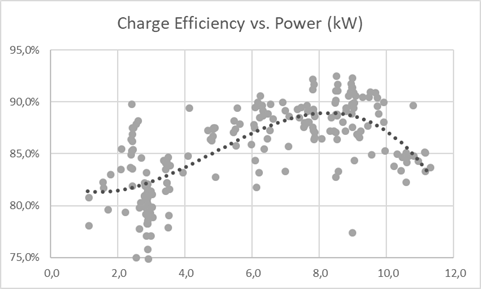It's a relatively known fact that, when charging any EV, there are losses.
These:
The experiment:

To exclude voltage differences as a possible explanation: data regarding of the charging sessions between 227v and 233v (56 charges):

(same pattern as previous graph)
Conclusions regarding charging efficiency:
Summing it up: nothing new, just some measurements of the famous charging losses.
This other topic, however, is a real doozy!
These:
- Are mainly related to the efficiency of the car’s onboard inverter in the AC/DC conversion, but can also result from
- active cooling of the battery during charging. That happens when charging at higher amps and/or for a long time and/or in a hot climate,
- the cabling from your electrical box to your charger. When charging at 16kW, you can have a ~3% loss (484W loss) on a 50 meter 4.0mm2 cable from the electrical box to your charger
The experiment:
- The hardware:
- Car: Model S 85D (pre-facelift) with 11kW European onboard charger.
- Charger: Tesla Mobile Connector, connected to the meter with an 18 meter 4.0mm2 cable run. Therefore, the cable losses are around 0,5%.
- Meter: Eastron SDM630-Modbus (MID compliant) at the electrical box, double checked with readings from Teslafi.com.
- The charging:
- Over 200 home charges, for a total of 4.000 kWh added to the battery.
- Excluded charges of less than 1 hour.
- Charged from anything between 1x5A (1-phase) to 3x16A (3-phase).
- I believe losses to battery cooling were minimized, because ambient temperature was 15 to 20ºC and charging only started several hours after the last daily drive, giving enough time for the battery to cool down.
- Charging efficiency = Energy added to the battery / Energy measured at the electrical box (and paid to the utility). 100% = no losses.
To exclude voltage differences as a possible explanation: data regarding of the charging sessions between 227v and 233v (56 charges):
(same pattern as previous graph)
Conclusions regarding charging efficiency:
- The best charging efficiency, of around 89,5%, was obtained at 3x13A (9kW)
- If you can charge at 3x16A… don’t! You’re wasting energy. Lower to 3x13A.
- At 1x13A (1-phase), charging efficiency was around 80%.
Summing it up: nothing new, just some measurements of the famous charging losses.
This other topic, however, is a real doozy!
Attachments
Last edited:




